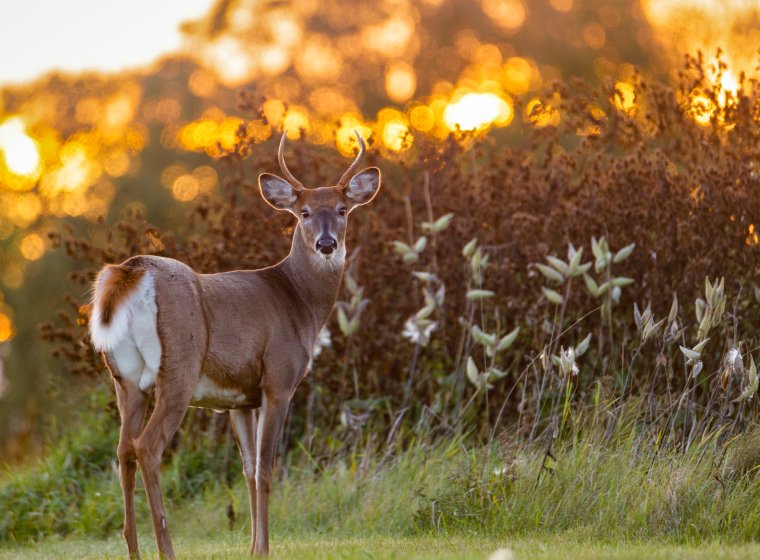Overview
Chronic wasting disease (CWD) is a highly infectious disease that impacts cervids such as deer, elk, moose and woodland caribou. It is caused by infectious abnormal proteins called prions, which accumulate in the brain and other tissues leading to death. CWD has not been detected in Ontario wildlife, but has been found in all our neighbouring provinces and U.S. states. CWD is a highly contagious, untreatable and fatal disease. There is no treatment, cure or vaccine to prevent it.
CWD is spread through:
- contact with the saliva, urine, feces and blood of infected animals
- exposure to a contaminated environment
There is evidence the disease may remain infectious in the environment, such as in soil, for years.
Taking action
Prevent
What we are doing to keep CWD out of Ontario, and how you can help.
Monitor
How we test for CWD and how you can help.
Respond
How we plan to respond to a CWD detection, and how you can support an effective response.
Signs of CWD
Cervids infected with CWD may not show visible signs of disease for several years, infected animals usually appear normal before signs of illness develop. These signs include:
Animals infected with CWD may exhibit:
- severe loss of body weight and body condition
- abnormal behaviour, including indifference to human activity
- tremors, stumbling, lack of coordination or paralysis
- excessive drinking and urination
- excessive salivation or drooling
- drooping head or ears
Some of these signs may also be seen in other diseases or injuries.
Report a sick or dead wild cervid
Everyone can help monitor for CWD. If you see a sick or dead wild cervid (deer, moose, elk or caribou), report it.
Report escaped captive cervids
These animals can potentially spread CWD and other diseases to wild cervids.
Report the escape or unauthorized release of any captive cervid immediately to the local ministry work centre.
Where CWD is found
Chronic wasting disease was originally discovered in Colorado in 1967. Since then, it has been detected in over 35 U.S. states and 5 Canadian provinces. CWD has also been found in South Korea, Norway, Sweden and Finland.
Distribution of Chronic Wasting Disease in North America
We have been monitoring wild deer in Ontario and have tested over 16,000 samples. CWD has not been detected in any sample.
Chronic wasting disease and human health
There is no definitive scientific evidence to suggest that chronic wasting disease is transmissible to humans and there have been no reported cases of CWD infection in humans.
As a precaution, public health officials including Health Canada and the World Health Organization recommend taking proper precautions when handling cervid carcasses and avoiding exposure to, and consumption of, CWD-infected animals.
Research on this topic
There is ongoing research on the potential for human infection with chronic wasting disease. Some animal studies suggest that transmission to humans may be possible. While research continues, it is important to be cautious.
Safely handle wildlife carcasses
Although CWD has not been detected in wildlife in Ontario, it is recommended that hunters follow these good practices when handling and processing wildlife to protect against disease:
- don't hunt or eat animals that appear sick or are found dead
- wear latex or rubber gloves and eye protection when field dressing carcasses
- avoid contact with respiratory tissues and fluids as much as possible
- wear a well-fitting face mask or respirator when exposure to respiratory tissues and fluids cannot be avoided
- minimize the handling of brain, eyes, skull bones and spinal tissue as this is where the highest concentration of CWD prions, if present, would be found
- avoid touching your face and don't eat, drink or smoke while processing carcasses
- process carcasses outdoors or in a well-ventilated area
- keep pets and hunting dogs away from carcasses and discarded tissues
- don’t consume the brain, spinal cord, eyes, spleen, tonsils or lymph nodes of harvested animals or feed these parts to pets
- decontaminate your tools by removing organic material and then soaking tools for at least 5 minutes in a 40% household bleach solution
- cook your game meat to recommended safe internal temperatures (74°C or 165°F)
- practice good hand hygiene
If you are hunting within a CWD surveillance area, save the head and submit it for CWD testing.
CWD Prevention and Response Plan
Read our Chronic wasting disease prevention and response plan.
Our actions to prevent, monitor for and respond to any detection of CWD are part of implementing this plan. A primary goal is to minimize the threat posed by CWD and help protect the socio-economic, cultural and ecological benefits of Ontario’s wild white-tailed deer, moose, American elk and woodland caribou.
This plan was updated in 2019 to reflect current scientific knowledge, lessons learned from other jurisdictions and the evolving roles of government agencies.
Partnerships
Ontario is working with these partners to prevent CWD, monitor for CWD and prepare for a CWD detection:
- Indigenous communities
- hunters
- stakeholders
- other agencies, such as
- the Canadian Food Inspection Agency
- Ontario Ministry of Agriculture, Food and Agribusiness
- Canadian Wildlife Health Cooperative.
16,000+
surveillance samples tested since 2002
0
confirmed cases of CWD in Ontario wildlife
